

Connective_Knowledge-19May2012.pdf (application/pdf objekt) 100 Excellent Open Course Links for the Ultimate DIY Geek. If you like to create and explore, open courses online are a great way to improve your DIY skills.

Whether you’re interested in computers, science, art, or other creative subjects, there’s something for you to find. Check out these online college courses to learn about advanced topics in DIY. Computers Master programming and other computer skills using these courses. Introduction to Computers: Follow this course for an introduction to computers and computer science. Art & Music Photography, sculpture, music, and more are available to you in these courses. Exploring Self in Society: Write and explore with this course.
Gardening & Home Improvement Take these courses to improve your green thumb and home improvement skills. Introduction to Building Technology: You can gain an understanding of buildings with this course. Design Graphic design and related subjects are the focus of these courses. Design: Study the process of design in this course. Automotive Science. Are online learners frustrated with collaborative learning experiences? Neus Capdeferro and Margarida Romero Universitat Oberta de Catalunya (UOC), Spain Abstract Online education increasingly puts emphasis on collaborative learning methods.
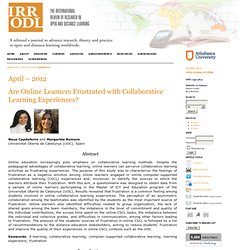
Despite the pedagogical advantages of collaborative learning, online learners can perceive collaborative learning activities as frustrating experiences. The purpose of this study was to characterize the feelings of frustration as a negative emotion among online learners engaged in online computer-supported collaborative learning (CSCL) experiences and, moreover, to identify the sources to which the learners attribute their frustration. With this aim, a questionnaire was designed to obtain data from a sample of online learners participating in the Master of ICT and Education program of the Universitat Oberta de Catalunya (UOC).
Connected Learning: A New Research-Driven Initiative. Connected Learning, a new research-driven initiative, was introduced at the Digital Media and Learning Conference 2012.
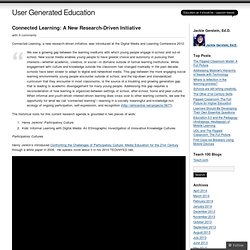
We see a growing gap between the learning mediums with which young people engage in-school and out-of-school. New social media enables young people to have greater choice and autonomy in pursuing their interests—whether academic, creative, or social—in domains outside of formal learning institutions. While engagement with culture and knowledge outside the classroom has changed markedly in the past decade, schools have been slower to adapt to digital and networked media.
This gap between the more engaging social learning environments young people encounter outside of school, and the top-down and standardized curriculum that they encounter in most classrooms, is the source of a troubling and growing generation gap that is leading to academic disengagement for many young people. The historical roots for this current research agenda is grounded in two pieces of work: Vzdělávání v prostředí počítačových sítí aneb Downesův svět konektivismu. Spojit se, či nespojit se?
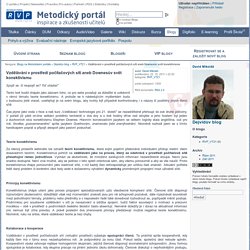
Toť otázka! “ Tento text budiž chápán jako záznam toho, co pro sebe považuji za důležité si uvědomit v rámci tématu teorie konektivismu. Kooperující žák jako člen informační společnosti. Text článku: Cíle současné školy je možné vidět v uspokojení poptávky žáků coby jejích zákazníků.
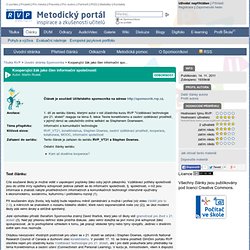
Vzdělávací potřeby společnosti jsou do určité míry vyjádřeny schopností jedince zařadit se do informační společnosti, tj. společnosti, v níž jsou informace a znalosti nabyté prostřednictvím informačních a komunikačních technologií intenzivně využívány k ekonomickému, sociálnímu, kulturnímu i politickému rozvoji (1). Při současném stylu života, kdy každý bude nejednou měnit zaměstnání a možná i profesi (viz video Věděli jste to 2.0), a měnících se znalostech o rozsahu lidského vědění, které navíc exponenciálně roste (viz (2)), se úkol moderní školy zdá velmi široký a obtížně splnitelný. Jisté východisko přináší čtenářům Spomocníka známý David Warlick, který jako cíl školy vidí gramotnost pro život v 21. století (3). Kam až dosáhne kooperace? Text článku:
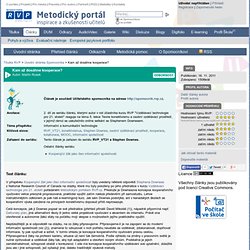
Collaboration Grid. By John Spencer In working with collaborative groups, I've noticed that tools are often chosen based upon comfort level, trendiness or simplicity rather than the function or the format in relationship to identity of the group and the purpose of the task.
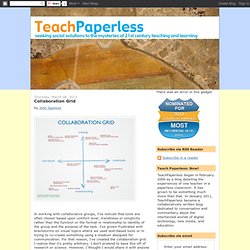
I've grown frustrated with brainstorms on visual topics where we used text-based tools or in trying to co-create something using a medium designed for communication. For that reason, I've created the collaboration grid. I realize that it's pretty arbitrary. I don't pretend to base this off of research or science. When I think about collaboration, I tend to think in two domains. In terms of online collaboration tools, I find myself using Twitter or Google Chat for sharing ideas and using Google Docs or Prezi for co-creating. A few questions to consider: Are we helping to ensure that we are creating rather than simply consuming information? Collaboration and Cooperation. I was asked, by email: I was very interested in your distinction Groups vs Networks.
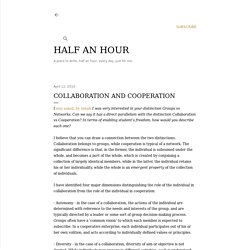
Can we say it has a direct parallelism with the distinction Collaboration vs Cooperation? In terms of enabling student’s freedom, how would you describe each one? I believe that you can draw a connection between the two distinctions. Collaboration belongs to groups, while cooperation is typical of a network. The significant difference is that, in the former, the individual is subsumed under the whole, and becomes a part of the whole, which is created by conjoining a collection of largely identical members, while in the latter, the individual retains his or her individuality, while the whole is an emergent property of the collection of individuals. I have identified four major dimensions distinguishing the role of the individual in collaboration from the role of the individual in cooperation: